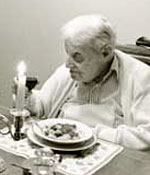|
9. We're more aware of the risks of heart disease, thanks to the man who invented K-rations

| Ancel Keys conducted groundbreaking research into the roles that fat, cholesterol and smoking play in causing heart disease. Keys is now 97.
(Photo courtesy of the University of Minnesota)
|
By the time World War II began, Professor Ancel Keys was already well known for his studies of health and human biology at the University of Minnesota's Laboratory of Physical Hygiene. In 1941, the U.S. Army asked him to develop a compact meal for combat troops. The K-rations were named for Keys, and were tested by soldiers at Fort Snelling.
K-rations consisted of biscuits, canned meat, candy and powdered coffee or lemonade. Despite the objection of Keys, the Army added a less than healthful item to the
K-rations package: cigarettes and matches.
Later, tobacco would play a major role in Ancel Keys' research into the risk factors for heart disease. His work pointed to smoking as one cause of heart disease, along with high blood pressure and high cholesterol. Ancel Keys was the first researcher to conclude that dietary fat played a major role in heart disease.
In his landmark study, known as the "Seven Countries" study, Keys looked at whole populations and established that cultural phenomena, diet and activity are the major factors in determining the risk of heart disease. The study, which was published in 1970, concluded that a diet low in saturated fats will have a low cholestrol value, a diet high in saturated fats will lead to high cholesterol. That pioneering research on cholesterol and its effect on heart disease made Ancel Keys the only member of the University of Minnesota faculty to ever appear on the cover of Time magazine.
|